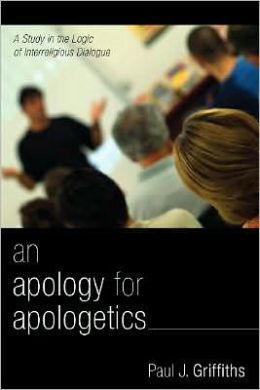
An Apology for Apologetics
Paul J. Griffiths (Wipf & Stock Pub: December 1, 2007), 126 pages.An Apology for Apologetics argues that a vigorous apologetics is a vital component of any sound effort at interreligious dialogue. Griffiths shows that a spirited defense of each religious tradition must be made by people who are both committed to their “truth” and open to serious criticisms by members of other faith traditions. He demonstrates why and how such a recognition of the necessity of interreligious apologetics (the “NOIA principle”) runs counter to the underlying presuppositions of many proponents of interreligious dialogue. Griffiths raises the specter of an unacceptable price that will be paid if the apologetic enterprise is abandoned. Religious traditions, he shows convincingly, will face relegation to the realm of purely private opinion and religious people will be denied the minimum plausibility they need to engage in public discourse. He argues ultimately that if basic doctrines cannot be defended against alien claims, religious tradition cannot survive. This book will without a doubt stimulate the debate it seeks to introduce: it unapologetically issues a challenge to teacup ecumenists and lazy pluralists. An Apology for Apologetics is for all who are seriously concerned with their own religious communities. It shows how to think about (and communicate with) those whose practices and convictions seem to differ significantly from one’s own.
Table of Contents
- Preface xi
- The Necessity of Interreligious Apologetics 1
- The Principle of the Necessity of Interreligious Apologetics 1
- Religious Communities and Their Representative Intellectuals 3
- Doctrine-Expressing Sentences 9
- Alien Religious Claims 12
- Interreligious Apologetics as a Duty 14
- A Brief Comment on Salvation 17
- The Properties of Doctrine-Expressing Sentences 19
- The Comprehensibility of Doctrine-Expressing Sentences 21
- The Commensurability of Doctrine-Expressing Sentences 27
- The Cognitive Content of Doctrine-Expressing Sentences 31
- Conceptual Relativism 31
- Experiential Expressivism 36
- Rule Theory 39
- Incompatibility among Doctrine-Expressing Sentences 45
- Universalist Perspectivalism 46
- Esotericist Perspectivalism 50
- The Varieties of Mystical Experience 52
- The Cognitive Value of the Varieties of Mystical Experience 55
- The Rejection of Positive Apologetics 60
- The Argument from Negative Effect 60
- The Argument That Success Is Impossible 63
- The Argument That PositiveApologetics Is Unnecessary for the Preservation of Epistemic
- Respectability 67
- An Excursus on the Case of the Pumpkinites 71
- The Argument that Positive Apologetics is Unnecessary for the Preservation of Ethical
- Respectability 74
- The Argument That Positive Apologetics Is Idolatry 75
- Proper Apologetics 77
- The Political Context 77
- The Expectations of the Apologist 80
- Community-Specific, Self-Guaranteeing Authority Sources 82
- Apologetics in Action: Buddhists and Christians on Selves 83
- A Buddhist Rejection of the Self 86
- A Buddhist Description of the Person 89
- A Christian Description of the Person as Embodied Soul 94
- A Christian-Buddhist Apologetic on Selves and Persons 99
- Bibliography 109